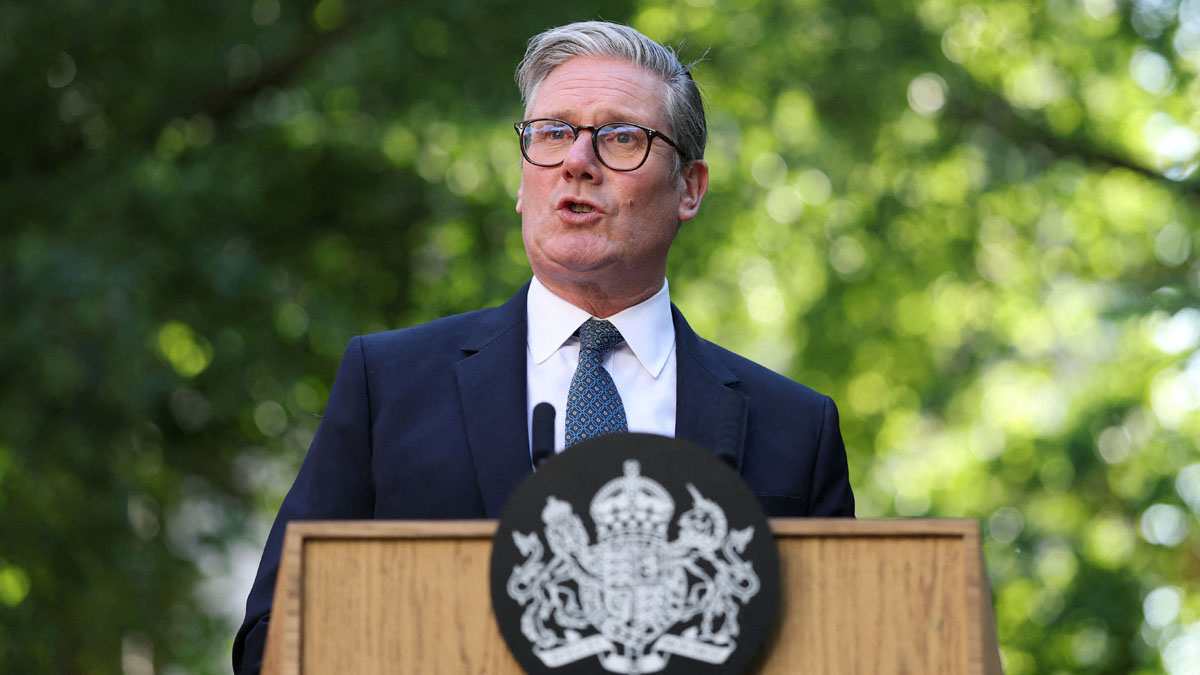Iran-UK diplomatic row deepens amid espionage charges and new security measures
 Britain's Prime Minister Keir Starmer delivers a speech during a reception in Downing Street, central London on May 19, 2025 following the UK-EU Summit earlier in the day. Britain and the European Union reached a landmark deal setting out closer ties on defence and trade, and launching a new chapter after the UK's acrimonious exit from the bloc five years ago. (Photo by Hannah McKay / POOL / AFP)
Britain's Prime Minister Keir Starmer delivers a speech during a reception in Downing Street, central London on May 19, 2025 following the UK-EU Summit earlier in the day. Britain and the European Union reached a landmark deal setting out closer ties on defence and trade, and launching a new chapter after the UK's acrimonious exit from the bloc five years ago. (Photo by Hannah McKay / POOL / AFP)
Britain summoned Iran’s ambassador on May 19 following the indictment of three Iranian nationals accused of spying on UK soil, marking a significant deterioration in diplomatic relations between London and Tehran. The episode unfolds against the backdrop of heightened tensions and increasing concern over Iran-linked operations within Britain, with implications extending beyond bilateral ties and potentially influencing Iran’s broader international engagements.
The latest escalation could also adversely affect Iran’s ongoing nuclear negotiations with the US, which are delicately poised at the moment, after four rounds of talks.
The three Iranian men—Mostafa Sepahvand, 39, Farhad Javadi Manesh, 44, and Shapoor Qalehali Khani Noori, 55—appeared in a London court on May 17, charged with activities likely to assist the Iranian foreign intelligence service. The Metropolitan police allege that the trio engaged in surveillance and reconnaissance targeting UK-based journalists associated with Iran International, an opposition news outlet banned in Iran and labelled a terrorist organisation by the regime. The charges relate to conduct between August 2024 and February 2025.
One of the accused, Sepahvand, faces an additional charge of planning serious violence against individuals in the UK. His co-defendants, Manesh and Noori, are similarly accused of participating in activities designed to facilitate acts of violence by others. All three were granted temporary asylum in the UK between 2016 and 2022, having entered the country through irregular means, including small boats and lorries. They have been remanded in custody and are scheduled to appear on June 6 for a preliminary hearing.
The UK Foreign Office responded swiftly to the court proceedings by summoning Iranian Ambassador Seyed Ali Mousavi. In a statement, the government declared that “protecting national security remains our top priority and Iran must be held accountable for its actions.” The move follows Iran's summoning of a British diplomat on May 18 to protest what it described as the “illegal and unjustified” arrest of an Iranian citizen in the UK—a response it said reflected politically motivated judicial conduct and a violation of international law.
This tit-for-tat exchange has only worsened an already fraying relationship between the two countries. Iranian state media accused the UK of “unconstructive behaviour,” warning that continued actions of this nature could have serious consequences for diplomatic relations.
Compounding the situation, five other Iranian nationals were arrested across multiple locations in England as part of a separate counter-terrorism investigation. Four of these men, detained on suspicion of preparing a terrorist act, were later released, while one was granted bail. Although no charges have yet been filed in connection with this second probe, police emphasised that the investigation remains ongoing.
In response to the growing threats posed by foreign state actors, Home Secretary Yvette Cooper announced plans on May 19 to introduce new legislation aimed at banning state-backed organisations such as Iran’s Islamic Revolutionary Guard Corps (IRGC). Current legal mechanisms, based on the Terrorism Act 2000, were originally designed to target non-state terrorist groups and are deemed insufficient for tackling the activities of state-affiliated entities.
Cooper’s statement followed the publication of a review by Jonathan Hall, the government’s independent reviewer of terrorism legislation. Hall concluded that existing laws were inadequate for countering state-sponsored threats, remarking that applying anti-terror laws to state actors was akin to “shopping in the wrong department”.
The home secretary echoed this concern in the House of Commons, emphasising that “old boundaries between state threats, terrorists and organised criminals are being eroded.” She noted that malign foreign powers are exploiting weaknesses across British systems, from border control and cybersecurity to criminal networks, in order to destabilise the country.
Security services have previously revealed that MI5 and the police responded to at least 20 Iran-backed plots posing potentially lethal threats within the UK. The espionage charges and subsequent political fallout underscore an escalating pattern of state interference that she said Britain could no longer ignore.
As the British government moves to strengthen its legal arsenal against foreign interference, Cooper issued a firm warning: “We will not tolerate growing state threats on our soil. We must strengthen our powers to protect national security, and ensure that those who seek to do us harm—wherever they come from—are held to account.”
Middle East